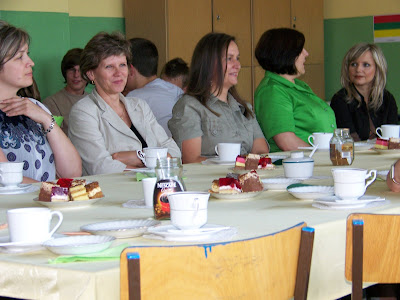
Mrs. Anna Koprowska is our school librarian. On 29th May she organized the Bread Contest. Everybody could take part in it. After two years of talking about “A Slice of Bread” it was a piece of cake to win a very nice prize.
Konkurs o chlebie
Cele konkursu:
• poszerzenie i utrwalenie wiadomości związanych z tematem chleba,
• budzenie zainteresowań czytelniczych,
Regulamin konkursu
Biblioteka szkolna organizuje konkurs „Od ziarenka do bochenka”.
Warunki konkursu:
• w konkursie może wziąć udział każdy uczeń szkoły podstawowej
• konkurs odbędzie się w bibliotece szkolnej w dniu 29 maja 2009 o godzinie 9.00
• uczestnictwo w konkursie należy zgłosić do dnia 28 maja w bibliotece szkolnej
• uczestnicy przynoszą własne przybory do pisania
• ogłoszenie wyników nastąpi 2 czerwca 2009
• laureaci zostaną nagrodzeni dyplomami i nagrodami
Konkurs o chlebie „Od ziarenka do bochenka”
I
Rozwiąż krzyżówkę. Za każde odgadnięte hasło można uzyskać 1 punkt, dodatkowo 2 punkty za hasło powstałe z rozwiązania krzyżówki.
Pieczemy pieczywo w …
Z wyrośniętego ciasta formujemy …
Rolnik obsiewa …
Kto pracuje w piekarni?…
Z mąki pszennej powstaje …
II
Za każdą prawidłową odpowiedź można otrzymać 1 punkt.
Pytania:
1. Podaj podstawowe składniki chleba - …………………………………………………..
2. Z jakich zbóż można robić mąkę ? (2 przykłady) - ………………………………………
3. Kto pierwszy (jaki naród) zastosował drożdże do spulchniania chleba? - ………
4. Czy opłatek to chleb?....................................
5. Jak nazywa się naczynie, w którym zarabia się ciasto na chleb? - ……………………………..
6. Które zboże człowiek uprawiał wcześniej - pszenicę czy żyto? - …………………………
7. Gdzie miele się ziarno na chleb?...........................................
8. Jak nazywało się urządzenie do mielenia ziarna, składające się z kamiennych kół? …………………………………………
9. Jak nazywało się pierwotne narzędzie do kopania ziemi? …………………………
10. Jak nazywało się pierwotne narzędzie do koszenia zboża? - ……………………
11. Do czego służyły cepy? - …………………………
12. Wymień 3 gatunki chleba - ………………
13. Co robi młynarz?.............................
14. Czym się wita u nas specjalnych gości? - …………
15. Kto robi chleb? ..........................
























